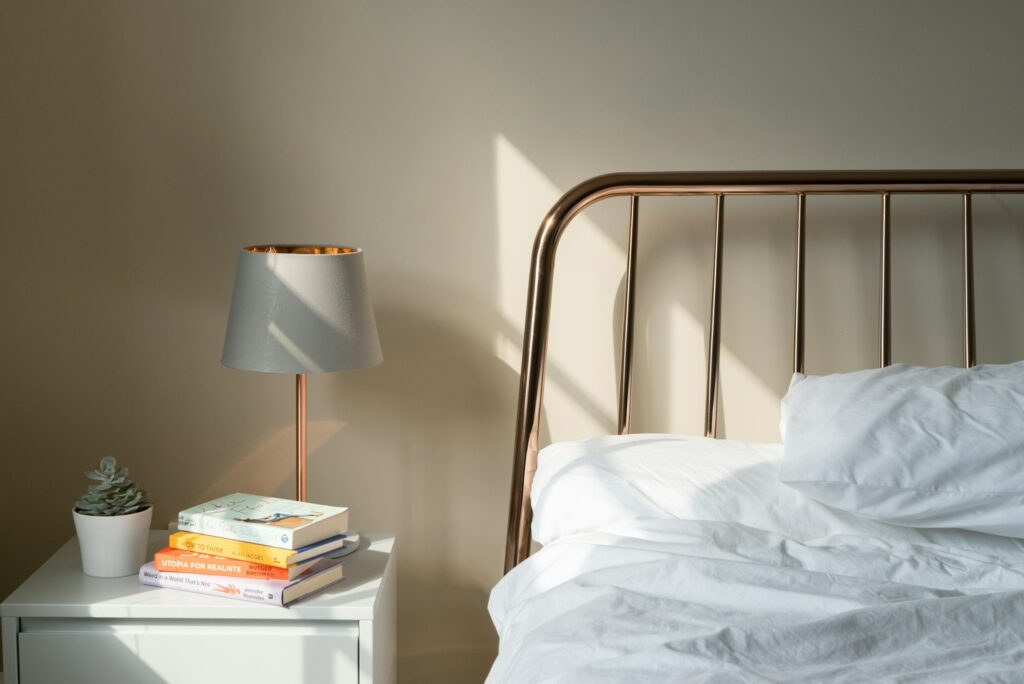


Have trouble sleeping and want to know how to go to sleep faster? You’re not alone. Taking a long time to fall asleep is a struggle for many people.
In this article, we will share 10 easy tips to help you drift off quickly. By following some of these tips, you will start to see the changes in your night routine.
One of the most important things you can do to fall asleep faster is to maintain a consistent sleep schedule.
This can be done by going to bed and waking up at the same time each day, even on weekends. This helps to regulate your body’s internal circadian clock.
Create a relaxing bedtime routine by incorporating calming activities into your evening schedule. This is especially helpful if you have trouble falling asleep.
Before bed, engage in activities that help you wind down and relax. For example: read a book, take a warm bath, or practice meditation.
Incorporate calming elements into your bedroom for better rest. Here are three tips to help you fall asleep faster and improve your sleep hygiene habits:
The military sleep technique is known to help soldiers achieve sleep in two minutes. This can be effective if you are looking to sleep as soon as possible.
What you want to do is to start by finding a comfortable position. Take deep breaths to relax your body, and focus on relaxing your entire muscles.
Relax your upper body followed by your lower body. Clear your thoughts and imagine yourself being at peace. Soon, you will find yourself in dream land.
By incorporating this technique, you can improve your ability to fall asleep fast.
For a peaceful and relaxing way to fall asleep faster, try incorporating peaceful sounds into your bedtime routine. Listening to soothing music can help you create a calming atmosphere that promotes sleep. (include sounds that are peaceful and relaxing)
Here are some benefits of using such sounds to help you fall asleep quickly:
Incorporating peaceful music into your sleep routine can be a simple and effective way to fall asleep faster and improve your overall sleep quality. With ShutEye® you can create a fully customizable soundscape for your sleep.
By avoiding caffeine and alcohol before bed, you can support faster sleep onset and improve your overall sleep quality. Caffeine blocks the production of melatonin, a hormone that regulates sleep, making it harder for you to fall asleep.
Similarly, alcohol may initially make you feel drowsy, but it can disrupt your sleep later in the night, preventing you from falling into a deep and restful sleep. To promote better sleep and fall asleep faster, it is recommended to avoid consuming caffeine and alcohol in the hours leading up to bedtime. Instead, opt for herbal tea or other decaffeinated beverages to help you wind down.
By making this simple adjustment to your sleep schedule, you can improve your sleep quality and wake up feeling refreshed.

You should also try to manage any stress or anxiety that you have as it can keep you up at night. Consider practicing deep breathing exercises or meditating. Another option is to incorporate the progressive muscle relaxation technique. It can improve your sleep onset and sleep quality.
Here are the steps to try:
This technique helps release bodily stress and promotes a state of relaxation, making it easier for you to drift off to sleep. By incorporating progressive muscle relaxation into your sleep hygiene habits, you can enhance your ability to fall asleep faster and enjoy a more restful night’s sleep.
Try to limit your naps during the day. If. you really need to take one, opt for a power nap. Power naps are short 10-20 minutes nap. Try not to exceed longer than that as it keep could make you want to sleep more.
You should also take these naps earlier in the day. Ensure that it is not too close to your bedtime. Otherwise, you may not be able to fall asleep at night.
Diet plays an important role in helping you feel well rested. Besides avoiding caffeine and alcohol, you should also avoid large or heavy meals close to bedtime. Not being able to fully digest your food could keep you up at night.

Try to engage in regular physical activity during the day. It could be taking a walk, jogging or doing vigorous exercises.
Exercise can promote better sleep. However, if you are planning to do vigorous workouts, try to do it earlier in the day. Avoid doing it to close to bedtime.
Understanding sleep latency is essential for optimizing your sleep health and achieving restful nights of sleep. Sleep latency refers to the time it takes for you to fall asleep. A healthy sleep latency period typically ranges from 15 to 20 minutes.
If it takes you less than 10 minutes to fall asleep, it may indicate sleep deprivation. On the other hand, taking too long to fall asleep, also known as insomnia, may indicate unhealthy sleep.
Improving sleep onset latency can be achieved through techniques and sleep hygiene habits.
It’s important to remember that everyone has their own personalized sleep profile, so finding the techniques that work best for you is crucial. By incorporating these techniques into your bedtime routine, you can improve your sleep latency and enjoy better sleep quality.
If you’re having trouble falling asleep quickly, it’s important to address and overcome any sleep problems you may be experiencing. Here are some tips to help you identify and address sleep problems:

If you struggle with falling asleep quickly, some various techniques and strategies can help improve your sleep latency.
From having a consistent sleep schedule, military method to exercising regularly, these methods aim to reduce bedtime stress and induce relaxation.
By implementing these tips and strategies, you can optimize your sleep health and enjoy the benefits of a restful night’s sleep.
Cleveland Clinic (2020) If You Fall Asleep Instantly — Is That a Good Thing? [online]. Available at: https://health.clevelandclinic.org/if-you-fall-asleep-instantly-is-that-a-good-thing-2/